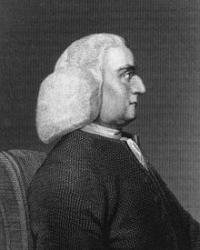1789 - 1825 Hymnal Number: 504 Author of "Acquaint thyself quickly, O sinner, with God" in Songs for the Sanctuary; or Psalms and Hymns for Christian Worship (Baptist Ed.) Born: August 17, 1789, Firth, Lilliesleaf, Roxburgh, Scotland.
Died: November 12, 1825, Edinburgh, Scotland.
Buried: New Calton Burial Ground, Edinburgh, Scotland.
Knox, William, born at Firth, Lilliesleaf, Roxburgh, Aug. 17, 1789, and educated at the parish school, and the grammar school at Musselburgh. For some time he was engaged in farming at Wrae, near Langholm, Dumfriesshire; but not succeeding to his satisfaction, he left Wrae in 1817, and finally settled in Edinburgh in 1820, where he subsequently obtained employment as a contributor to the public journals. He died in Edinburgh, Nov. 12, 1825. His poetical works were, (1) The Lonely Hearth, North Shields, 1818 ; (2) Songs of Israel, 1824; (3) The Harp of Zion, 1825; and (4) these three works, together with a short Memoir, as his Poems, &c, Lond., J. Johnson, 1847. The Songs and Harp are mainly paraphrases of portions of Holy Scripture. A few have come into use as congregational hymns, as, "A voice comes from Ramah," "Acquaint thee, O mortal," "O sweet as vernal dews that fall" (Ps. cxxxiii.), and others.
--John Julian, Dictionary of Hymnology (1907)
William Knox


 My Starred Hymns
My Starred Hymns




